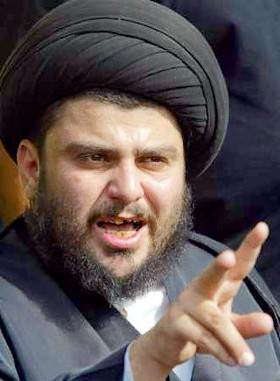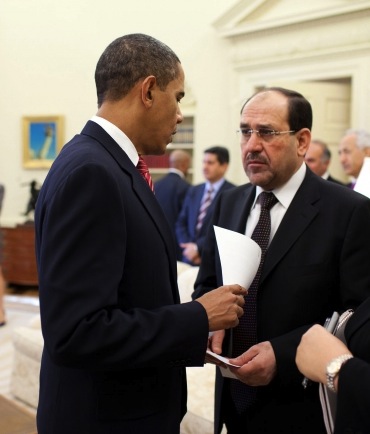http://news.antiwar.com/2013/01/01/sadr-endorses-sunni-protests-in-western-iraq/
 Sadr insisted Maliki bears “fullresponsibility” for the protests, and says that the Sunnis have a right to continue with peaceful demonstrations criticizing the government, adding “beware of the Arab Spring in Iraq.”
Sadr insisted Maliki bears “fullresponsibility” for the protests, and says that the Sunnis have a right to continue with peaceful demonstrations criticizing the government, adding “beware of the Arab Spring in Iraq.”
 “Don’t think it’s difficult for the government to take measures against you or to re-open the road and put an end to this matter,” Malikiwarned, adding that the government had been “very patient” but that would soon end.
“Don’t think it’s difficult for the government to take measures against you or to re-open the road and put an end to this matter,” Malikiwarned, adding that the government had been “very patient” but that would soon end.
and....
http://antiwar.com/blog/2012/12/31/us-support-for-dictatorship-in-iraq-sowing-future-chaos/
 And now, with Maliki having secured essentially dictatorial power in Iraq since the US withdrawal, not only is the continuing US support and training for Maliki’s private army of sectarian thugs an essential tool in terrorizing innocent Iraqis, but it is bolstering al-Qaeda-linked groups and stoking sectarian tensions that could lead to civil war.
And now, with Maliki having secured essentially dictatorial power in Iraq since the US withdrawal, not only is the continuing US support and training for Maliki’s private army of sectarian thugs an essential tool in terrorizing innocent Iraqis, but it is bolstering al-Qaeda-linked groups and stoking sectarian tensions that could lead to civil war.
Sadr Endorses Sunni Protests in Western Iraq
Maliki Warns Protests 'Unconstitutional,' Threatens Govt Retaliation
by Jason Ditz, January 01, 2013
Anti-government protests continue in Western Iraq, with Sunni demonstrators continuing to condemn the Maliki government for mass arrests of the security teams working for Finance Minister Rafie Issawi, and got a shot in the arm with a public endorsement from Moqtada al-Sadr.
 Sadr insisted Maliki bears “fullresponsibility” for the protests, and says that the Sunnis have a right to continue with peaceful demonstrations criticizing the government, adding “beware of the Arab Spring in Iraq.”
Sadr insisted Maliki bears “fullresponsibility” for the protests, and says that the Sunnis have a right to continue with peaceful demonstrations criticizing the government, adding “beware of the Arab Spring in Iraq.”
Sadr’s support is key because he is not only a political rival of Maliki, but also a very influential Shi’ite cleric, and his support will make a crackdown against the protesters more difficult.
Not that Maliki seems to be noticing, as he delivered a speech warning he would not tolerate the “unconstitutional” protests for long, and that it wouldn’t be difficult for the government to crush their movement.
and Sadr seems to be challenging Maliki - where does Iran stand in this battle of wills among Shi'ites ?
http://news.antiwar.com/2013/01/01/iraqs-maliki-condemns-unconstitutional-sunni-protests/
Iraq’s Maliki Condemns ‘Unconstitutional’ Sunni Protests
Won't Tolerate Public Demonstrations Indefinitely
by Jason Ditz, January 01, 2013
Iraqi Prime Minister Nouri al-Maliki today condemned the thousands of Sunni protesters continuing to demonstrate in the Anbar Province, insisting that public protests against his regime are “unconstitutional” and won’t be tolerated for much longer.
 “Don’t think it’s difficult for the government to take measures against you or to re-open the road and put an end to this matter,” Malikiwarned, adding that the government had been “very patient” but that would soon end.
“Don’t think it’s difficult for the government to take measures against you or to re-open the road and put an end to this matter,” Malikiwarned, adding that the government had been “very patient” but that would soon end.
The protests began after the mass arrest of office workers and security for Finance Minister Rafie Issawi, who officials have since insisted are all “terrorists.” Sunni protesters see Iraq’s loose “terrorism” laws as being exploited to keep Sunni politicians marginalized, even though the Iraqiya Party has the largest plurality in the government they have only a handful of government posts, including Vice President Tareq al-Hashemi, who is sentenced to death in exile as a “terrorist.”
Maliki did offer one concession to the protesters, announcing that he is going to release some 700 Sunni women who are in detention on a “special amnesty.“
and....
http://antiwar.com/blog/2012/12/31/us-support-for-dictatorship-in-iraq-sowing-future-chaos/
US Support for Dictatorship in Iraq Sowing Future Chaos
John Glaser, December 31, 2012
The state structures built in Iraq by the US military occupation are now the depraved tools of repression. First among these tools is the US-trained and equipped Iraqi Special Operations Forces (ISOF). By the time Washington was preparing to draw down forces in Iraq, writes Robert Tollast in The National Interest, “elements of ISOF were already being used as a private army by Iraqi prime minister Nouri al-Maliki.”
 And now, with Maliki having secured essentially dictatorial power in Iraq since the US withdrawal, not only is the continuing US support and training for Maliki’s private army of sectarian thugs an essential tool in terrorizing innocent Iraqis, but it is bolstering al-Qaeda-linked groups and stoking sectarian tensions that could lead to civil war.
And now, with Maliki having secured essentially dictatorial power in Iraq since the US withdrawal, not only is the continuing US support and training for Maliki’s private army of sectarian thugs an essential tool in terrorizing innocent Iraqis, but it is bolstering al-Qaeda-linked groups and stoking sectarian tensions that could lead to civil war.
“Blame here can only go to Maliki,” writes Tollast, who “controls ISOF through the Counterterrorism Bureau, which has proved a useful tool for crushing dissent” and has been “implicated in the intimidation, arrest and even murder of Sunni politicians and opposition figures.”
The Obama administration has kept largely quiet about Maliki’s behavior, aside from about $2 billion in annual aid and tens of billions in military assistance. While this keeps the halls of power in Washington and the oil corporations happy, even the best case scenarios are damning, for Iraqi citizens as well as the geopolitics of the region.
“Maliki is heading towards an incredibly destructive dictatorship, and it looks to me as though the Obama administration is waving him across the finishing line,” Toby Dodge, an Iraq expert at the London School of Economics said earlier this year. “Meanwhile, the most likely outcomes, which are either dictatorship or civil war, would be catastrophic because Iraq sits between Iran and Syria.”
According to Tollast, the strength of al-Qaeda in Iraq has doubled over the past year. Instead of carrying counter-terrorism – “essentially the art of increasing political legitimacy, isolating terrorists from their support base and then eliminating them” – Maliki has been using his security forces in a way that undermines their political legitimacy and reinforces their support base. And as far as civil war goes: angered Kurds and Sunnis say their disenfranchisement has never been greater. This increases the chances more Iraqis will join the latent insurgency still underway there.
Lately, America really seems to have a knack for indirectly strengthening the terrorist groups they claim to fight against. And in their effort to continue propping up dictatorships throughout the Middle East, Washington is sowing deep resentment among the local populations, which ultimately feeds instability. And in the age of Arab uprisings against US-backed totalitarianism, Washington is plain old stupid to keep it up.
and......
http://news.xinhuanet.com/english/world/2012-12/31/c_124168482.htm
|
| English.news.cn 2012-12-31 03:36:49 |
BAGHDAD, Dec. 30 (Xinhua) -- Iraqi Deputy Prime Minister Saleh al-Mutlak survived an assassination attempt on Sunday during taking part in a protest in province of Anbar, 110 km west of Baghdad, MENA news agency reported citing a statement released al- Mutlak's office.
A number of al-Mutlak's bodyguards were wounded in the attack, the statement said. Protests have intensified since the arrests last week of bodyguards of Sunni Finance Minister Rafie al-Issawi.
Opponents accuse Shiite Prime Minister Nouri Maliki of seeking to marginalize Iraq's Sunni political leaders.
Maliki insisted that he did not order last Thursday's arrests and suggested that they were the result of an investigation undertaken by the judiciary.
and......
http://www.upi.com/Top_News/World-News/2012/12/31/Maliki-Ankara-failed-to-split-away-Kurds/UPI-19681356988190/
BAGHDAD, Dec. 31 (UPI) -- Turkey has unsuccessfully tried to split Iraq into Arab and Kurdish camps, Iraqi Prime Minister Nouri al-Maliki charged Monday.
Maliki made the claim during an interview with Someria TV in Iraq, alleging Ankara was interfering in Iraq's domestic affairs, Today's Zaman reported.
Maliki said Turkey had made a deal with leaders of Iraq's autonomous Kurdish region in which ethnic Turks in Kirkuk would not oppose a claim by Kurds that Kirkuk belonged to them.
Iraq and Turkey also are on opposite sides of the Syrian conflict, with Turkey supporting the opposition and Iraq opposed to calls for President Bashar Assad to step down.
The bad feelings between Turkey and Iraq threaten not only trade between the two countries, but Turkish businessmen living in Iraq, warned Ercument Aksoy, chairman of the Turkish-Iraqi Business Council at the Foreign Economic Relations Board.
"The possibility of an attack against Turkish businesspeople is real, as was the case for Turkish truck drivers in the past," he said.
"Turkey should take steps to ease the tension with the Iraq central government. Otherwise, the tension may well hit Turkey's exports and businesses in Iraq," Aksoy said.
Maliki made the claim during an interview with Someria TV in Iraq, alleging Ankara was interfering in Iraq's domestic affairs, Today's Zaman reported.
Maliki said Turkey had made a deal with leaders of Iraq's autonomous Kurdish region in which ethnic Turks in Kirkuk would not oppose a claim by Kurds that Kirkuk belonged to them.
Iraq and Turkey also are on opposite sides of the Syrian conflict, with Turkey supporting the opposition and Iraq opposed to calls for President Bashar Assad to step down.
The bad feelings between Turkey and Iraq threaten not only trade between the two countries, but Turkish businessmen living in Iraq, warned Ercument Aksoy, chairman of the Turkish-Iraqi Business Council at the Foreign Economic Relations Board.
"The possibility of an attack against Turkish businesspeople is real, as was the case for Turkish truck drivers in the past," he said.
"Turkey should take steps to ease the tension with the Iraq central government. Otherwise, the tension may well hit Turkey's exports and businesses in Iraq," Aksoy said.
Diplomatic relations between the countries sank in the past week when Iraq denied a plane carrying Turkish Energy Minister Taner Yildiz permission to land. Yildiz was on his way to attend a conference in Arbil.
No comments:
Post a Comment